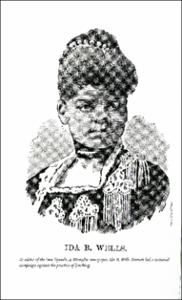Please use this identifier to cite or link to this item:
http://hdl.handle.net/10267/28393| Title: | The Literary Life of Ida B. Wells-Barnett: Rewriting the Consciousness of a Nation |
| Other Titles: | Rhodes Institute for Regional Studies Student Papers |
| Authors: | Hildenbrand, Sarah |
| Advisors: | Huebner, Timothy S. |
| Keywords: | Memphis Center;Student research;Institute for Regional Studies;Papers;Text |
| Issue Date: | 2005 |
| Publisher: | Memphis, Tenn. : Rhodes College |
| Abstract: | Within the last forty years, a resurgence of scholarly interest in Ida B. Wells-Barnett has erupted, likely catalyzed by the long-coming publication of her autobiography, Crusade for justice (1970), by Wells' daughter, Alfreda M. Duster. In her editorial introduction to the autobiography, Duster laments that the "measure of success" Wells achieved in her lifetime "goes far beyond the credit she has been given in the history of the country" (Crusade xxxii). While perhaps Wells has still not received her due in the publics historical consciousness for her incalculable and oftentimes revolutionary accomplishments, scholars have reacted to Ms. Dusters plea by publishing the rest of Wells' remaining writings and by supplying a wealth of criticism on her historical roles and social activism. Although some preliminary discussions regarding Wells' rhetorical strategies and contributions to the black literary tradition have taken place, her work as a literary artist remains largely unexplored. Henry Louis Gates, Jr.s book on black literary theory, The Signifying Monkey: A Theory of Afro-American Literary Criticism (1988), attempts to describe "how richly textured and layered that black literary artistry indeed is," and simultaneously, the dialogue of the African-American culture of which Wells was a participant (Signifying xx). By examining Wells' works with the concept of African-American Signification in mind, an opportunity arises to investigate more fully Wells' works and develop a deeper appreciation for them as pieces of historical and artistic literature. Such an analysis places her more definitely among the literary ranks of predecessors and contemporaries, such as Frederick Douglass and WE.B. Du Bois, and her literary and theoretical descendant, Toni Morrison. |
| Description: | Scanned and uploaded by Will Clinton '19. |
| URI: | http://hdl.handle.net/10267/28393 |
| Appears in Collections: | Rhodes Institute for Regional Studies |
Files in This Item:
| File | Description | Size | Format | |
|---|---|---|---|---|
| Hildenbrand_Sarah_Ida_ocr.pdf | 14.05 MB | Adobe PDF |  View/Open |
Items in DSpace are protected by copyright, with all rights reserved, unless otherwise indicated.